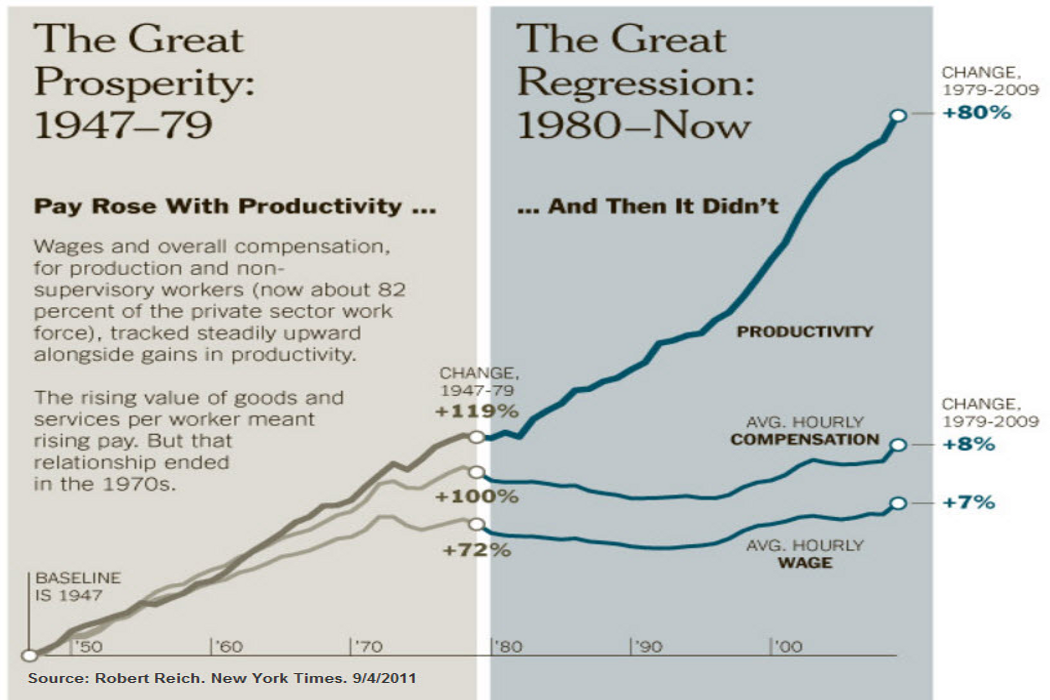
Date: 2025-04-02 Page is: DBtxt003.php L07-01-PERFORMANCE
|
PERFORMANCE
of the SOCIO-ENVIRO-ECONOMIC SYSTEM |
| . |
| FINANCIALIZATION HAS BEEN GOOD FOR OWNERS BUT NOT FOR MOST OF THE WORKING MIDDLE CLASS |
STOCKS UP

Stock market has been spectacular |
WAGES FLAT

and wages flatlining while productivity grows. |
GDP growing / GPI flat

While GDP is up, progress (GPI) is flat |
| . |
| AND IMPACT ON NATURAL CAPITAL IGNORED |
|
RESOURCE DEPLETION 
Mining for natural resources |
ENVIRONMENTAL DEGRADATION 
Deforestation for commercial agriculture |
CLIMATE INSTABILITY 
Catastrophic costs |
| . |
|
CONSIDER THE RESULTS
THE TRENDS ARE CATASTROPHIC |
| ACCOUNTING FOR SOCIAL, ECONOMIC AND NATURAL CAPITALS | |||
COLOR CODE

|
DISTANT PAST

|
PRESENT NOT GOOD

|
FUTURE COLLAPSE

|
| Aggregated Socio-Enviro-Economic Trends | |||
| What has been happening ... What needs to happen in the immediate future | |||
| THE WHOLE SYSTEM | THE ACTUAL PAST | A NO CHANGE FUTURE | A BETTER FUTURE |

|

|

|

|
| More and more DEPLETION and DEGRADATION of NATURAL CAPITAL is UNSUSTAINABLE | |||
| Industrial pollution has been seen as a problem for a very long time and has been addressed in some parts of the world (mainly Europe) since the early post war years. In the USA President Nixon's administration established the US Environmental Protection Agency (EPA) to address the problem of pollution and environmental degradation. Progress of the industrial revolution improved quality of life, as well as creating economic wealth. In aggregate, the depletion of resources and the degradation of the environment has continued and accelerated to the present time. There is a scientific consensus that this trajectory is unsutainable and must be changed to avoid catastrophic collapse. |
| . |
| POST WWII PROGRESS | |||
|
PRODUCTIVITY UP WAGES UP 
From end WWII to around 1980 |
STRONG
GDP GROWTH 
GDP growth has been very strong |
CAPITAL MARKETS
STOCK VALUES UP 
Stock market has been spectacular |
BETTER
HOUSING 
More decent housing to around 1980 |
| SINCE WWII, GREAT FINANCIAL PERFORMANCE TILL THE 1970s | |||
|
In the 'developed countries' there was a lot of social and economic progress post WWII up until the 1970s. Compared to the 1930s, most people in developed countries were better off, and people were also glad to be living in peace rather being at war.
People in less developed countries (LDCs) did not share so much in this increasing prosperity and agitated to change things. One result of this was 'independence' for many former colonial administrations. This played out in the 1950s, 60s and 70s with mixed results. Another event was the formation of the OPEC cartel (that is the Organization of Oil Exporting Countries) which succeeded in getting control of international oil markets in 1973 and raising the price of a barrel of oil from $3.50 to $13.50. The resulting 'oil shock' changed the global balances of economic power in important ways that still resonate almost 50 years later. |
| . |
| BUT MOST WORKERS IN THE WEST LEFT BEHIND SINCE AROUND 1980 | |||
|
PRODUCTIVITY UP
WAGES FLAT 
From around 1980 to present time |
GDP GROWING
GPI FLAT 
While GDP is up, progress (GPI) is flat |
MASSIVE
INEQUALITY 
Telling the truth |
DEGRADED
HOUSING 
Slums proliferating since 1980 |
|
US manufacturing became globally uncompetitive after the 1973 'oil shock'. US competitive advantage had been low energy prices relative to the rest of the world and this was over. US industry was energy inefficient and corporate profits crashed, together with stock markets. Prices soared together with inflation and interest rates. During the Reagan administration, trade unions and worker wages came under attack and since then wages have flatlined even as profits recovered.
Since the end of WWII there has been amazing technological progress. This has enabled improved productivity ... that is it has increased efficiency and lowered production costs. Lower production costs has come in big part from lower payroll costs, which has had a negative impact on worker income. Essentially worker wages have not increased significantly in 40 years, while productivity and profits have increased considerably. During the last few decades there have been major generational shifts in social norms. In aggregate the social and economic indicators suggest that this is progress, but more detail analysis suggests that some few have progressed quite well, rather more have regressed significantly. For many, quality of life has deteriorated, with increased stress and in the USA, record levels of suicide. | |||
| . |
| TOP 1% ... HUGE WEALTH and EXPENSIVE TOYS | ||||

Real Estate |

Luxury Yachts |

Private Jet |

Hermes handbag | |
| The accumulation of wealth during the past half century has been enormous. This has been enabled by 'financialization', the unconstrained concentration of economic power, reduced government regulation and amazing technological progress. Technological progress has enabled more effective profit management, and especially improved international logistics that has made it possible to build very low cost high profit supply chains. There are more billionaires in the modern world than at any time in history ... and new ones being created all the time. | ||||
| . |
| CATASTROPHIC SITUATION FOR BOTTOM OF THE PYRAMID | |||

Terrible Poverty |

Urban slums |

Malnutrition |

Genocide |
| The socio-economic performance for people at the 'bottom of the pyramid' has been unsatisfactory. In aggregate there have been billions of people who have moved up the economic ladder, driven in the main by the economic improvement in China, but there are still billions of people who are living in abject poverty. There are many more people migrating because of violence of economic deprivation than three decades ago and little progress being made to mitigate these humanirarian disasters. | |||
| Last ... L07-02-SEES-OVERVIEW | SiteNav L0700-SN-03-PROGRESS-PERFORMANCE | Next ... L07-04-STATE-CAPITALS |
| . |
STRONG GDP GROWTH

| GDP growth has been strong for a long time. It was an effective measure to help understand the Great Depression in the 1930s, and remains useful for less developed countries, but for advanced economies is is not effective at all. |
STOCK VALUES UP

| Stock price increases have been spectacular. The economy has become increasingly financialization since the 1980s which has been good for stock prices, but less so for workers in the economy. As long as companies and stockholders put profit before people nothing is going to change. Signs of change are now becoming evident. ESG is becoming fashionable and 'purpose' as a goal in addition to profit is a part of the talk. |
WAGES HAVE FLATLINED

| Post WWII, American workers were well paid and accumulating wealth from 1945 for about three decades. Since the 1970s American workers have hardly shared at all in the benefits of corporate productivity improvements. All of this gone to owners and top managers. Worse, bankers have facilitated consumption by providing massive amounts of credit and advertising has promoted buying and consumption well beyond what is reasonable. |
MOON SHOT

| Amazing things become possible when people are motivated to do them. Going to the moon is one such example. |
MEDICAL SCIENCE

| There are impressive scientific breakthroughs in medical science and all the other sciences. Research funding is essential, together with the money to deploy commercial applications. |
FOSSIL FUEL ENERGY

| There is a scientific consensus that fossil fuels contribute to GHGs and the global climate crisis. The lagacy energy industry argues that the economic importance of energy means that the status quo is the best policy, completely ignoring future risks of this behavior. Most fossil fuel companies seem to be protecting short term corporate value while completely ignoring the social and environmental costs of their decisions. |
RENEWABLE ENERGY

| Using conventional financial analysis, renewable energy ... wind and solar ... reduced in cost significantly during the past two decades. When the full cost of social and environmental issues are taken into consideration as well, fossil fueled power plants should be replaced as fast as new renewable power capacity can be built. There should be penalities levied for new construction of fossil fuel powered facilities. |
| . |
| HOME / #3 | BRIEFS | Last L07-02-TVM-MANAGEMENT | SN-03-PROGRESS-PERFORMANCE | L07-04-PROBLEMS-POSSIBILITIES |
| HOME | L07-04-SC | |||||||||||||
| Last ... L07-03-PROGRESS-PERFORMANCE | SiteNav L0700-SN-04-STATE-CAPITALS | Next ... L07-05-FLOW-ACTIVITIES | ||||||||||||
| HOME | SiteNav | Alpha | Chrono | Briefs | SEES | capitals | activities | actors | place | products | SI | SS | metrics | TPB |